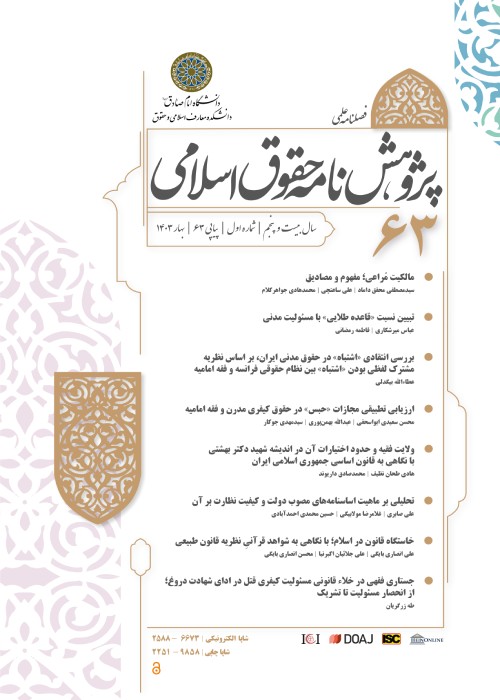Unacknowledged Islamic Legal Capacities in International Documentation: A Case Study of "Organisation of Islamic Cooperation's Strategy on the Elderly"
The Organisation of Islamic Cooperation (OIC) has recognized the impending demographic shift within its 57 member states, particularly concerning the aging population. Despite numerous international initiatives addressing demographic changes, the legal capacities within Islamic teachings regarding the rights of the elderly remain underexplored in international documentation. This extended abstract explores the unacknowledged Islamic legal capacities within the OIC's strategy on the elderly, shedding light on the neglected aspects of Islamic jurisprudence in addressing aging populations.
Research Question:
This study seeks to investigate whether the Organisation of Islamic Cooperation, as a religious entity, has effectively incorporated Islamic legal values into its strategy on the elderly. It aims to discern the extent to which Islamic legal principles are reflected in the documentation, highlighting any discrepancies between religious teachings and international policy frameworks.
Research Hypothesis:
It is hypothesized that while the OIC's strategy on the elderly may demonstrate recognition of the importance of addressing aging populations, there may be a gap in the integration of Islamic legal principles into the documentation. The hypothesis suggests that the OIC's strategy may not fully capitalize on the rich heritage of Islamic jurisprudence concerning the rights and protections afforded to the elderly.
Methodology & Framework, if Applicable:
Utilizing an analytical and descriptive approach, this study examines the OIC's strategy on the elderly, focusing on the foundational instrument approved in 2020. The methodology involves a comprehensive review and analysis of the text, with particular attention to the incorporation of Islamic legal principles. The framework for analysis encompasses several key aspects: the position of religious elements in documentation, the utilization of non-religious discourse, the convergence of member states' legislation on elderly rights, the role of women and family, and the introduction of new terminologies. These components provide a structured framework for evaluating the extent to which Islamic legal capacities are acknowledged and integrated within the OIC's strategy on the elderly.
In the subsequent sections of this extended abstract, the study will delve deeper into each aspect of the framework, offering critical insights into the documentation and its alignment with Islamic legal principles. The analysis aims to contribute to a better understanding of the intersection between religious values and international policy initiatives concerning aging populations within Islamic societies.
The analysis of the Organisation of Islamic Cooperation's strategy on the elderly reveals several noteworthy findings and prompts critical discussion regarding the integration of Islamic legal principles, the focus on financial matters, and the representation of women and family within the instrument.
The results indicate that while the strategy demonstrates timely recognition of population aging in Islamic societies, it falls short in substantively incorporating Islamic legal values. The instrument primarily emphasizes financial aspects and resource allocation, neglecting to establish qualitative criteria based on Sharia for addressing elderly rights. This raises questions about the extent to which the instrument reflects the unique legal heritage of Islamic societies and distinguishes itself from other international frameworks.
Furthermore, the discussion highlights the instrument’s approach to representing women and family within the context of elderly issues. While there is some attempt to deviate from state-centric obligations and acknowledge the role of women and family, the instrument’s treatment remains limited. This raises broader questions about the intersectionality of gender, family dynamics, and elderly rights within Islamic legal frameworks and international policy discourse.
Additionally, the analysis identifies shortcomings in the instrument’s utilization of innovative terminologies and legal convergence. The absence of an approach rooted in the realities of Islamic societies regarding labor rights and social security underscores the need for a more nuanced understanding of Islamic jurisprudence in addressing aging populations.
In conclusion, the Organisation of Islamic Cooperation's strategy on the elderly represents a significant step towards addressing the challenges posed by population aging in Islamic societies. However, the instrument falls short of fully capitalizing on Islamic legal capacities, particularly in establishing qualitative criteria based on Sharia for elderly rights. The absence of substantive values and the limited representation of women and family highlight areas for improvement in future iterations of the strategy.
The conclusion emphasizes the importance of incorporating national and religious culture into legal frameworks related to the elderly, as seen in the case of Iran. By aligning laws and instruments with Islamic principles, there is an opportunity to not only address domestic needs but also serve as a legislative model for other Islamic countries. Furthermore, the inclusion of innovative terminologies and a forward-looking understanding of Sharia can influence global discourse on elderly rights, extending beyond Islamic states.
In essence, the critique and evaluation of the Organisation of Islamic Cooperation's strategy on the elderly underscore the ongoing dialogue between national and international legal levels and the imperative of integrating Islamic legal principles into contemporary policy frameworks.
- حق عضویت دریافتی صرف حمایت از نشریات عضو و نگهداری، تکمیل و توسعه مگیران میشود.
- پرداخت حق اشتراک و دانلود مقالات اجازه بازنشر آن در سایر رسانههای چاپی و دیجیتال را به کاربر نمیدهد.


